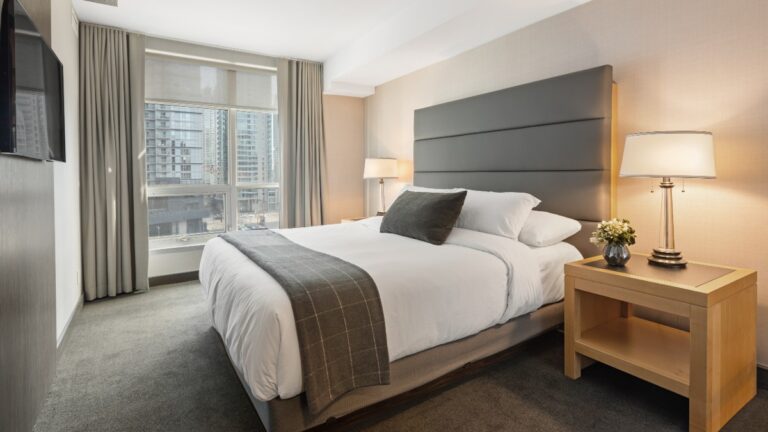How Old Do You Need To Be To Get a Hotel Room In Maine?

As participants in Amazon Associates and other programs, we earn from qualifying purchases. This comes at no additional cost to you. For more details, see our Affiliate Disclosure.
Planning a trip to Maine is exciting, with its scenic coastlines and famous lobster dishes. One key detail to sort out before you go is understanding the age requirement for booking a hotel room. It’s not the most exciting part of travel planning, but it’s essential for a smooth trip. This article will cover everything you need to know about how old you have to be to get a hotel room in Maine, ensuring your trip is both enjoyable and hassle-free.
Age Requirements: The Basic Rule in Maine
In Maine, the general age requirement for booking a hotel room is 18 years old. This is a standard rule across many states, including Maine. It’s based on the legal definition of adulthood, as 18 is the age when a person is typically considered legally responsible for their actions. Hotels enforce this age limit to ensure that their guests are capable of entering into a contractual agreement, which includes being liable for any damages or legal issues that might arise during their stay.
However, it’s important to note that some hotels in Maine may have higher age requirements, such as 21 or 25 years old. This is often the case in more upscale establishments or in hotels that offer amenities like a bar or casino, which have their own age restrictions. It’s always a good idea to check the specific age policy of the hotel before booking.
While the age requirement might seem restrictive, it’s in place for both the protection of the hotel and the guests. Younger travelers, especially those traveling alone, are often perceived as a higher risk for potential issues like property damage or inability to pay. By setting an age limit, hotels aim to minimize these risks.
Why Age Matters: Safety and Legal Aspects
The age requirement for booking a hotel room isn’t just a random rule; it’s deeply rooted in safety and legal considerations. Hotels are responsible for the safety and well-being of their guests. By ensuring that guests are at least 18 years old, hotels have a better chance of maintaining a safe and secure environment. Adults are more likely to be aware of emergency procedures and able to respond appropriately in case of an emergency.
From a legal standpoint, guests under the age of 18 are considered minors and therefore cannot legally enter into contracts. This includes the agreement you make when booking a hotel room. If a minor were to book a room and then cause damage or break hotel policies, the hotel would have limited recourse since the contract would be void. This is a significant risk for hotel operators, which is why the age requirement is strictly enforced.
Furthermore, the legal age requirement helps protect minors from potentially dangerous situations, like being unsupervised in an unfamiliar place. It’s a measure to ensure that young guests aren’t exposed to risks they might not be equipped to handle.
Exceptions to the Rule: When Younger Guests Can Book
There are exceptions to the age rule, though they are relatively rare. Some hotels may allow younger guests to book a room if they have a parent or guardian’s consent or if the parent or guardian is also staying in the hotel. This exception is often made for events like college visits or family emergencies.
In some cases, hotels may make an exception for young travelers who are married or in the military. These individuals are often considered to be emancipated minors and may be granted more responsibilities, including the ability to enter into legal contracts like a hotel room agreement.
It’s also worth noting that some hostels or budget accommodations may have more lenient age requirements. These establishments often cater to younger travelers and may have policies in place to accommodate them. However, it’s always important to check with the individual establishment for their specific rules.
ID and Verification: What You’ll Need to Show
When checking into a hotel in Maine, you’ll need to provide a valid form of identification. This is a critical step in the booking process. The most commonly accepted forms of ID are a driver’s license, passport, or state ID card. The ID should have your photo, name, and date of birth clearly displayed.
The purpose of showing ID is multifaceted. It verifies your age, ensuring you meet the hotel’s minimum age requirement. It also helps prevent fraud and ensures the person booking the room is the person who actually checks in. This is important for the hotel’s security policies and for the safety of all guests.
In addition to ID, some hotels may also require a credit card for incidentals. This is a standard practice in the hospitality industry. The credit card serves as a guarantee for any potential damages or additional charges incurred during the stay. It’s a form of security for the hotel, ensuring they have a way to cover expenses if necessary.
Tips for Underage Travelers: Alternatives and Advice
For travelers under the age requirement, there are still ways to enjoy a trip to Maine. One option is to travel with an adult who can book the hotel room. This could be a family member or a trusted adult friend. When traveling with an adult, the age requirement becomes a non-issue as the responsibility falls on the adult.
Another alternative is to look into accommodations that cater to younger travelers. Some hostels and guesthouses may have more flexible age policies. These establishments often provide a friendly and affordable environment for younger guests.
It’s also a good idea for underage travelers to carry a consent letter if traveling without their parents. This letter, ideally notarized, should state that the parents are aware of the trip and give their permission. While not always required, it can be helpful in situations where a minor needs to prove they have parental consent for their travel.
Understanding Hotel Policies: Beyond the Age Factor
Understanding a hotel’s age requirement is just one part of preparing for your stay. It’s also important to familiarize yourself with other hotel policies. These can include check-in and check-out times, cancellation policies, pet policies, and rules regarding amenities like pools or fitness centers.
Each hotel has its own set of policies, and these can vary significantly from one place to another. Knowing these policies ahead of time can help you avoid any surprises or misunderstandings during your stay.
Additionally, don’t hesitate to contact the hotel directly if you have any questions or special requests. Most hotels are more than willing to accommodate special needs or provide additional information to ensure a pleasant stay for their guests. Remember, the more informed you are, the smoother your travel experience will be.






